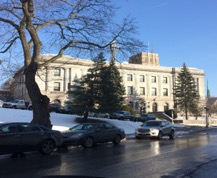By Adam LaFleur – The Spectator
February 14, 2019
BANGOR – Expanding Medicaid and fighting the opioid crisis are major priorities of the Bangor City Council in the new year. Much of the council’s ability to solve local problems relies on budgetary cooperation with the state. Former Governor Paul LePage reduced revenue sharing with municipalities in his efforts to cut statewide spending. While LePage’s spending cuts were popular with many Mainers, they forced cities like Bangor to slash services or raise local taxes.
First-term City Councilor Gretchen Schaefer is optimistic that new democratic Governor Janet Mills will help Bangor provide residents with access to affordable prescription medications and opioid treatment. Reversal of the LePage era revenue sharing cuts would make the state pay for more of the cost of these services. Mills will be working with a democratic controlled Maine State Legislative in her first term. This means the state is likely to increase revenue sharing with cities like Bangor.
Schaefer says Bangor is a “service city”, meaning that the City receives a portion of the sales tax collected within the city limits to fund local programs. These include Medicaid expansion and opioid addiction treatments. The amount of local sales tax at the City’s disposal varies depending on the policies of the sitting governor.
“Over the years our revenue sharing has been cut [under the LePage administration] so that while we have people coming from all over the state to Bangor and spending money here, the money they pay in sales taxes is going into the state’s funds and not ours,” Schaefer said. “This means we [the City] have to raise property taxes.”
Visit https://www.maine.gov/treasurer/revenue_sharing/index.html for more information on municipal revenue sharing in Maine. Read testimony from Bangor officials in support of increased revenue sharing at http://www.bangormaine.gov/testimony.
State funds used for revenue sharing come from state sales taxes, service provider taxes, and personal and corporate income taxes1. Populations of cities and towns and local tax assessments determine the amount of state revenue shared with separate communities.
“I ran the [revenue sharing] report for the fourth quarter of 2018 for Bangor, and we received a total of about $840,000 [from the state],” Schaefer said. “If we had full revenue sharing, it would be over 2 million coming back to the City. Mills’ proposal has incremental steps forward [to increase the percentage of state tax revenue shared with Bangor].”

Bangor City Hall Photo Credit: Adam LaFleur
Schaefer is hopeful that increased revenue sharing under the Mills administration will enable Bangor to spend less on health-related services. The City runs a general assistance program for residents who cannot afford prescription drugs. Prior to the administration of former Governor Paul LePage, the monthly cost of this program was approximately $2,000 from the Bangor budget. Under LePage, the state prevented “able bodied adults” from receiving Medicaid benefits, Schaefer said. As a result, the City of Bangor presently spends about $15,000 per month in prescription-related expenses for low-income individuals. This is an increased monthly cost of $13,000 from the previous price of operating the service, Schaefer said. She is hopeful that Medicaid expansion at the state level, under the Governor Mills administration, will return the monthly cost of Bangor’s general assistance program to pre-LePage levels. The savings in the City budget could then be used fund other priorities.
Medicaid expansion in Maine will also reduce the cost of fighting the opioid crisis by increasing the public’s access to medical care. Schaefer says people who struggle with drug addiction have limited options when they lack medical insurance. Treatment centers are expensive to operate. Bangor does not have a city-run treatment facility for drug rehab patients. People arrested on drug-related charges often end up receiving treatment in the Penobscot County Jail.
“I know that the jail [which is county] ends up treating inmates and that it is a huge issue there,” Schaefer said. “It’s located in our city, but not our budget, but the drug problem is not local to Bangor. The opioid problem impacts the police department, it impacts the jails, it impacts public health, it impacts everything.”
Schaefer believes expanded Medicaid will help fight the opioid crisis by providing low-income individuals increased access to treatment. The amount Bangor spends on health-related issues in 2019 depends on revenue sharing policies enacted by the state government in Augusta.
Bangor City Council meets at 7:30pm on the second and fourth Mondays of each month on the third floor of City Hall. Council members are elected on a nonpartisan basis. Schaefer says all meetings stream live on video with Facebook Live.
References
1 https://www.maine.gov/treasurer/revenue_sharing/index.html

